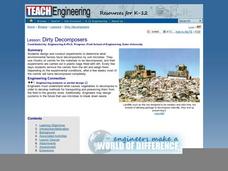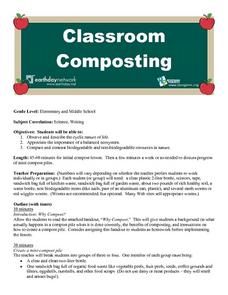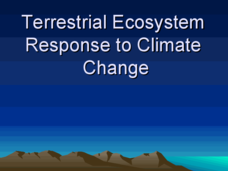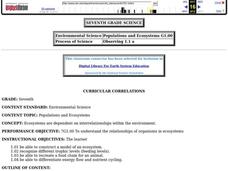Curated OER
The good microbes
The question posed for the class to consider; What would decay and what would not? They read the short passage on decomposition and microbes, then mark the items that would decay after a two-week period. A scientific investigation idea...
Curated OER
Bug Detective
What happens when a living thing dies? After reading a paragraph of background knowledge on the life cycle of bugs, third and fourth graders work through four clues to figure out which bug is which. When they finish, they can study the...
Curated OER
Microbes and Climate
Pupils examine how microbes play a role in the climate system. In this climate lesson students complete an activity, create a PowerPoint presentation and present it to the class.
Curated OER
Dirty Decomposers
Learners explore the ecosystem by conducting a ziploc bag experiment. In this recycling lesson, students identify decomposer organisms in our environment and how they speed up the recycling process. Learners utilize a ziploc plastic bag,...
Nuffield Foundation
Microbes Ate My Homework
Now you have a new excuse not to do your homework. A long-term experiment has learners explore cellulose-digesting enzymes. They simulate how paper breaks down in a compost bin. There's no need to blame your dog for eating your homework...
Howard Hughes Medical Institute
Winogradsky Columns: Microbial Ecology in the Classroom
Substances that decompose with the help of living organisms do so at different rates. Scholars experiment with Winogradsky columns to determine the rate of decomposition, the oxygen and sulfide content changes, and bacteria levels. The...
K20 LEARN
Microbes and Manure = Biofuel
Waste not, want not! Science scholars explore manure as an alternative energy source through reading and experimentation. Groups construct their own biofuel digesters and observe the process of methane production. The teacher's guide...
Science Matters
Matter Cycles — Sum It Up
Scholars become part of the cycle of matter with a reader's theater that showcases producers, consumers, decomposers, and the sun. A diagram and discussion concludes the learning experience and enhances comprehension.
Teach Engineering
Dirty Decomposers
Do not let the class just sit and rot. Pupils learn how decomposition and nutrient recycling is important to an ecosystem. Groups design an experiment to determine how environmental conditions affect decomposition. They develop a poster...
Curated OER
Dirty Decomposers
Seventh graders design and conduct experiments to determine what environmental factors favor decomposition by soil microbes. They use chunks of carrot for the materials to be decomposed, and their experiments are carried out in plastic...
Curated OER
Microorganisms
Though there are seventy-seven slides in this PowerPoint, only small bits of information are presented on each. It outlines the roles microorganisms play in the environment and spends time listing characteristics of each four different...
Curated OER
Dirt Life
Students select and collect soil samples from a variety of locations (schoolyard, home, etc.). They do this lab after an interest-generating discussion about "dirt" and microbes. Students make a dilution in sterile water, plate it on a...
Curated OER
Decomposers at Work!
Students design and conduct investigations that illustrate the process of decomposition. After a lecture/demo, students simulate the process of soil composting in the classroom. They closely chart the decomposition of their soil.
Curated OER
TE Activity: How Fast Can a Carrot Rot?
Young scholars experiment to define which environmental factors favor decomposition by soil microbes. They decompose carrots in dirt, weigh the carrots periodically to determine how long it takes. They look at how engineers use this type...
Curated OER
Classroom Composting
Learners discover the benefits of composting. They identify the steps of decomposition as well. They are read a book and discuss what items decompose.
Curated OER
Micro-organisms
Students learn what a micro-organism is. In this micro-organism lesson plan, students understand that micro-organisms may be too small to see. Students learn microorganisms could be bacteria, fungi, something beneficial or a harmful...
Curated OER
Observing Compost Invertebrates
Second graders examine compost piles and what invertebrates help decompose the organic matter. In this compost invertebrates lesson students collect invertebrates found in a compost pile and examine them.
Curated OER
Interactive Biogeochemical Cycle
Learners gain understanding of several of the biogeochemical processes in microbial mats. They acquire knowledge of the different roles of organisms in a microbial mat ecosystem. They understand how microbial mat ecosystems contributed...
Curated OER
Terrestrial Ecosystem Response to Climate Change
An extensive investigation of the Earth's climate changes awaits your environmental science classes. This top-notch presentation begins by looking at the history of Earth's climate and then predicts the impact on each major terrestrial...
Curated OER
Land Quality Issues
In this unit of lessons, students examine land quality issues. They discover food chains and practice reading them. They also examine the erosion of soil and how it affects the environment.
Curated OER
Eutrophication Experiments
Observe two different water samples and write down observations. Write a paragraph which predicts the relative amounts of nutrients, nitrates, and phosphates in the water samples. Compare water samples under a microscope.
Curated OER
Populations and Ecosystems
Seventh graders create a model of an ecosystem and label it to show structure and function. They research the food web of an aquatic animal and also trace energy flow from the primary producer up the food chain.
Curated OER
COMPARE SOILS BY GROWING PLANTS
The student will identify the difference in the rate of plant growth in three soils that vary in organic matter.1. Obtain three to four flowerpots, different types of soil, a record chart, three to five beans for each pot, and water....
























